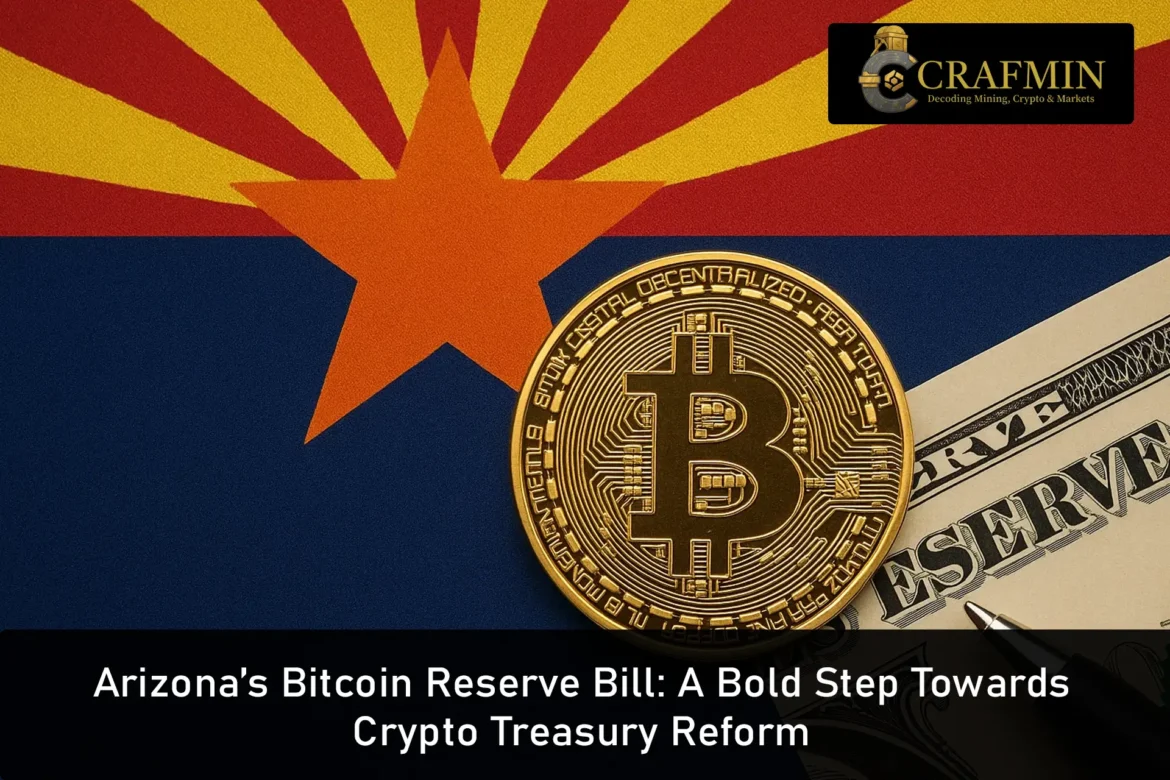Arizona Leads with First-of-Its-Kind Bitcoin Reserve Bill
Arizona is turning heads across the U.S. as it moves closer to passing a landmark bill that would allow the state to hold Bitcoin and other seized cryptocurrencies in a dedicated reserve. The bill, having already cleared the Senate, is now under review by the House—and it’s igniting fierce conversation across both political and financial landscapes.
The proposed legislation would set a precedent by letting Arizona retain and manage confiscated digital currencies instead of liquidating them immediately. It’s a game-changing concept that signals a shift in how local governments approach crypto—not just as seized evidence, but as a strategic financial resource.

Arizona’s Bitcoin Bill: A Bold Crypto Treasury Move ( Image Source: CoinReporter )
Storing, Not Selling: Arizona’s Innovative Crypto Strategy
The core of this legislation lies in its intent to hold onto seized cryptocurrencies rather than sell them off. If passed, Arizona would store these digital assets in a formal crypto reserve fund.
This represents a major shift from the traditional method. Traditionally, authorities sell off seized assets quickly, converting them to fiat. But Arizona’s model echoes traditional financial reserves—similar to how governments manage gold or foreign currency holdings—only this time, it’s Bitcoin.
Supporters argue that this will help the state build a stronger financial future and take advantage of rising asset values over time.
Crypto Policy Catching Up to the Times
Arizona’s proposal is about more than just coins and custody. It’s a broader reflection of the evolving relationship between governments and digital assets. For years, crypto has lived in a legal limbo—either ignored or treated with scepticism.
Now, as more governments worldwide explore cryptocurrency use cases, including El Salvador’s adoption of Bitcoin as legal tender, Arizona is stepping up domestically with a practical, state-level policy.
If implemented, the bill could inspire other states to consider similar paths. What began as isolated crypto seizures in cybercrime cases may soon become structured, long-term holdings.
Also Read: Coinbase Stock on the Brink: Critical Price Levels to Monitor as COIN Tests Breakout Potential
Opportunity or Gamble? The Political Divide
While the bill has its champions, it’s not without controversy. Proponents see it as a smart response to the modern digital economy. They argue that with increasing amounts of Bitcoin being seized in fraud and cybercrime cases, the state must adapt.
“This is about being pragmatic,” one Arizona senator explained. “We’re not speculating—we’re safeguarding what’s already in our possession and making sure it’s managed properly.”
Sceptics, however, raise valid concerns. The high volatility of cryptocurrencies could create financial risk for state funds. Critics worry that storing Bitcoin could backfire during bear markets or lead to losses if proper safeguards aren’t in place.
Still, the bill’s backers argue that volatility isn’t new to financial management—it just requires clear guidelines and responsible oversight.
After a narrow Senate win, Arizona’s revived #Bitcoin Reserve Bill heads to the House.
If passed, it could make Arizona the first U.S. state to manage seized #crypto through a dedicated reserve fund.
Full storyhttps://t.co/b6fCo2uyIF#CoinPedia #CryptoNews #Blockchain…
— Coinpedia (@CoinpediaNews) June 20, 2025
What Happens If the Bill Passes?
Should the House give the green light, Arizona will become a trailblazer in formalising the handling of seized digital assets. It would be among the first states in the U.S. to create an official crypto reserve policy.
But implementing the law comes with serious logistical and technical challenges. Safekeeping digital currencies requires secure wallets, cybersecurity protocols, transparent reporting, and compliance with federal and state-level regulations.
This could prompt the creation of new state roles focused on digital asset management, as well as collaboration with blockchain security firms. Arizona may also need to establish clear accounting practices tailored to crypto holdings.
Potential Public Benefits—and What’s Next
The long-term vision goes beyond merely storing Bitcoin. If this bill becomes law, it could eventually pave the way for using crypto assets in broader state financial planning—potentially funding infrastructure projects, public services, or even paying off state debt.
It’s a bold vision, but one that could reflect the increasing maturity of the crypto ecosystem.
Nonetheless, the short-term objective remains simple: ensuring seized crypto is managed securely and transparently. The success or failure of this framework could determine how digital assets are handled across the U.S. going forward.
Global Echoes: A Step Toward Decentralised Fiscal Strategy
Arizona’s move doesn’t exist in isolation. Around the world, more governments are experimenting with digital assets in national strategies. While some countries embrace crypto at the federal level, others are observing from the sidelines.
By taking initiative at the state level, Arizona is opening the door for a more decentralised approach to crypto governance in the U.S.—where each state creates its own crypto playbook. If others follow suit, the result could be a patchwork of Bitcoin-holding states, all contributing to a broader financial transformation.
Why Everyday Australians Should Pay Attention
You don’t need to own Bitcoin to be affected by this development. As governments around the world begin to integrate crypto into policy, the ripple effects will be felt across traditional finance.
Arizona’s action highlights that crypto has moved beyond the margins—it’s now becoming part of mainstream financial policy.
This raises crucial questions for the future: Should crypto be treated like contraband—or as an asset class worthy of official custody and long-term strategy?
Arizona is betting on the latter—and the world is watching.
Conclusion: A Milestone for Crypto Governance
Arizona’s Bitcoin reserve bill is more than just a legislative proposal—it’s a potential milestone in the way governments engage with digital assets.
As the House prepares to debate the bill, one thing is clear: this is no longer a tech experiment or speculative fad. It’s policy in action.
If passed, Arizona will hold more than just Bitcoin—it will hold the key to a new approach to public finance in the digital age.

